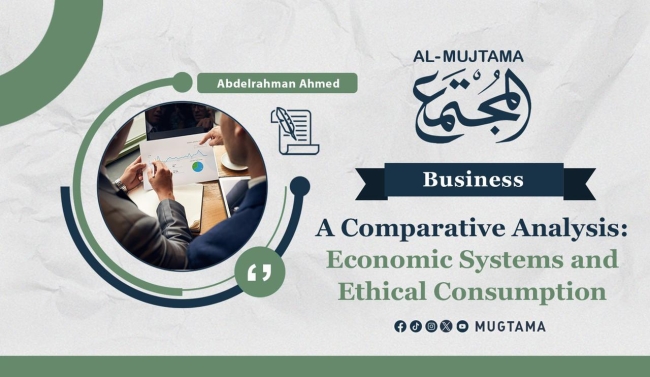A Comparative Analysis: Economic Systems and Ethical Consumption
The realm of economics extends far beyond the mere exchange of goods and services; it delves into the intricate interplay between socio-economic structures and human values. In this essay, we embark on a comparative journey between two prominent economic systems: capitalism and Islamic economics. Through this exploration, we aim to unravel how each system shapes consumption patterns and distribution mechanisms, and how it intertwines with ethical considerations.
Capitalism and the Cult of Materialism:
Capitalism, hailed for its promotion of individualism and market freedom, has undeniably exalted materialistic pursuits while sidelining spiritual and ethical dimensions. Within the capitalist framework, consumption is often synonymous with hedonistic pleasure, perpetuated by deceptive advertising and a globalized culture of excess. Here, the relentless pursuit of profit reigns supreme, leading to a commodification of desires and a disregard for moral values. The capitalist ethos prioritizes the maximization of material utility for consumers, neglecting the holistic well-being of individuals and communities.
Islamic Economics: Balancing Material and Spiritual Needs:
In stark contrast, Islamic economics offers a paradigm that harmonizes material and spiritual aspirations within a framework guided by ethical principles. Central to Islamic economics is the concept of halal consumption, which encompasses not only the lawful acquisition of goods but also the adherence to moral standards in production and distribution. Consumption in Islamic economics is viewed through a lens that transcends mere gratification, emphasizing moderation, mindfulness, and ethical integrity.
Distribution Mechanisms: Social Justice vs. Wealth Accumulation:
Beyond consumption, the distribution of resources serves as a crucial pillar that distinguishes these economic systems. Capitalism's laissez-faire approach to distribution often results in stark wealth disparities, perpetuating a cycle of affluence for the few and deprivation for the many. Here, the concentration of capital in the hands of a privileged minority undermines social cohesion and exacerbates inequality. Allah Almighty says: "And what Allah restored to His Messenger from the people of the towns - it is for Allah and for the Messenger and for [his] near relatives and orphans and the [stranded] traveler - so that it will not be a perpetual distribution among the rich from among you. And whatever the Messenger has given you - take, and what he has forbidden you - refrain from. And fear Allah; indeed, Allah is severe in penalty." (Verse 7 from surah Al-Hashr)
Conversely, Islamic economics advocates for a distributive model grounded in social justice and equity. The Islamic concept of zakat, or obligatory almsgiving, serves as a mechanism for wealth redistribution, ensuring that resources are channeled towards the welfare of marginalized segments of society. Moreover, the prohibition of riba (usury) and gharar (uncertainty) in Islamic finance prevents the exploitation of vulnerable individuals and fosters economic stability.
Ethical Consumption: A Moral Imperative:
At the heart of these economic systems lies the imperative of ethical consumption. While capitalism fosters a culture of conspicuous consumption driven by materialistic desires, Islamic economics advocates for a conscientious approach to consumption rooted in ethical principles. In the capitalist milieu, advertising campaigns often manipulate human desires, fostering a culture of overconsumption and environmental degradation.
Conversely, Islamic ethics instill a sense of accountability and mindfulness in consumption patterns. The emphasis on moderation (i'tidal) and avoiding extravagance (israf) serves as a moral compass guiding individuals toward responsible consumption choices. Additionally, the concept of barakah (divine blessings) underscores the importance of ethical conduct in all economic transactions, highlighting the interconnectedness of material and spiritual well-being.
Conclusion:
In conclusion, the comparative analysis of capitalism and Islamic economics reveals contrasting paradigms of consumption and distribution deeply rooted in divergent ethical frameworks. While capitalism prioritizes material accumulation and market freedom, Islamic economics advocates for a holistic approach that balances material prosperity with spiritual fulfillment. As we navigate the complexities of contemporary economic challenges, it becomes imperative to reevaluate our consumption patterns and embrace ethical principles that promote the well-being of individuals and societies alike. Only through a concerted effort to integrate ethical considerations into economic discourse can we aspire towards a more just and sustainable future for all.
Source: Dr. Ashraf Dawaba | Al-Mugtama


